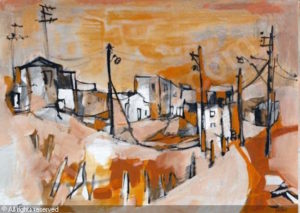Black Box, Amos’s novel published in 1986, has something apocalyptic about it. Already the title, taken from the world of aviation, suggests collecting evidence after a crash. But not only that, the novel has no third-person narrator; it is a collection of letters among the characters. We get a sense that this is all that was left of the family depicted in the novel and perhaps also from Israeli society.
It is a story of a broken Israeli family, entwined with the complex history of Israeli. Ilana Brandstatter is writing to her ex-husband, Alec Gideon. They have not been in touch for years. She now asks for his help looking after their unruly and somewhat disturbed son, Boaz. Alec Gideon is a professor at the University of Chicago; his field is research of fanaticism. Years ago he left his ex-wife and son without financial support. Ilana went to a kibbutz with her son. She later left it to re-marry, leaving Boaz in the kibbutz. He grew up wild, undisciplined, a free spirit without any education.
Into the plot steps Ilana’s second husband: Michael Somo. He is entirely different from all other characters, who are part of the Ashkenazi elite. Somo is a Sephardi Jew, an immigrant from Algeria, short and round, dressed as an orthodox Jew. At first, the reader cannot help but admire his warm heart and kind manners: he spoils his wife and their young daughter, preparing food they like, taking them to the cinema; he goes out of his way to help Boaz, his step-son; inviting him for weekends, finding him a job, and later sending him to a boarding school at a settlement in Kiryat Arba. But this sweet simple man, poor and modest, is undergoing a transformation: he asks Gideon, Ilana’s first husband, for money for Boaz. But this becomes a habit, a way of life. Alec Gideon, full of guilt for deserting his son, sends more and more money, with which Michael Somo buys fancy clothes, an apartment in the Jewish Quarter in the Old City of Jerusalem; he also uses the money to support Jewish settlements in the West Bank.
Michael Somo has another prominent quality: his spiritual world is that of Jewish sacred texts and exegesis. He is completely detached from Western culture and has no knowledge of Western thought, history, sciences. His world consists of the rabbi’s orders, Bible verses, and Talmudic rulings. Anything else is completely foreign to him, belonging to a world he finds false and invalid.
In the novel, this subculture prevails alongside Western culture, and the reader wonders what would happen: would the two cultures clash, will one overcome the other, perhaps a fruitful dialogue will develop? And how would the younger generation be affected?
Oz’s first observation is that the two cultures don’t mix. Michael Somo in not affected at all by his wife’s different perspective of life and later by that of her ex-husband and son. The very basis of his spiritual world is its seclusion. He feels he is driven by an ancient wisdom, which is distinct from Western thought. Thus, there is no room for a real dialogue; he relies on something he feels is beyond discourse.
Further, Somo resists what he sees as Western relativism. To him, fundamental truths are obvious, recognizable by all people, and need no for further interpretation. He writes to Boaz, his step-son, “And now for the dangerous opinion you wrote me—that the important thing in life is to have a good time. I was shocked; I won’t conceal it. Apparently it is from your wise-Alec father that you get this poison and then try to proclaim it in broken Hebrew. This idea, Boaz, is the source of all sins and better flee from it as from a plague. The important thing in life is to do what is right. It is really very simple. And don’t let your father and other wise guys of the same kind tricking you into thinking that right is a relative matter. We have nothing to do with this alien philosophy, which is just flowers and no fruits, as the sage said, and poisoned flowers at that. We have nothing to do with that pollution.”
Alec Gideon and Ilana are indifferent to his world—and so is Boaz. He moves to his grandfather’s rural estate, living there with two women, engaged in farming for his own consumption. Naturally reserved from the settlers’ spiritual seclusion yet not engaging in the rationalistic worldview of his father, Boaz is a sort of hippie: uneducated and lacking ambition but peaceful and generous
The end of the novel heralds an emotional closure in the “Western” family, perhaps as a result of the fanatic ideology spreading around them. Alec Gideon has cancer, and he comes to die in peace in his son’s house. Ilana comes to care for him, with her daughter. Micheal Somo is unaware of Alec’s illness and thinks his wife returned to her first husband with his daughter. He loses his gentle tone and threatens her and then has his daughter taken from her. As he finds out the Alec is dying, he offers prayer.
The broken family is reunited in these sad circumstances, refusing any attempt to deal with the tragedy with prayer, help from the rabbi, or asking for miracles.

I feel the same. In the past, people used to say that Judaism isn’t ‘missionary’ in any way, but in my opinion it is not true anymore. Sad.
Thanks for the lucid synopsis of Oz’s book. It very much relevant to my contacts with several orthodox Jews… who while believing in Kiruv…often display the attitude which you wrote of Somo: “Anything else is completely foreign to him, belonging to a world he finds false and invalid.” All is fine as long as one is part of the grand design of moving to what they see as towards propagating a holy life and descendants.